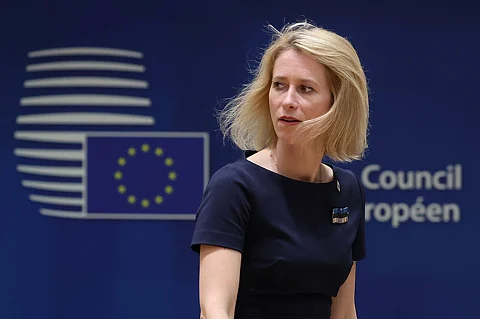

A proposal by EU High Representative Kaja Kallas to raise up to €40 billion in military support for Ukraine failed to gain sufficient political backing during a summit of European Union leaders on Thursday, casting serious doubt on its feasibility. The lukewarm response led some diplomats to declare the initiative effectively "dead."
The summit’s conclusions, endorsed by 26 countries after Hungary vetoed the full text, made only a passing reference to Kallas’ plan without specifying financial targets or objectives. The document stated: "The European Council recalls the initiatives to enhance EU military support to Ukraine, notably that of the High Representative to coordinate increased support by member states and other participating states, on a voluntary basis."
Notably absent from the conclusions was what Kallas described as the most "realistic" element of her proposal: €5 billion to procure 2 million artillery shells for Ukraine in the short term. Artillery ammunition is both cheaper and more readily available than advanced weaponry, making it a critical resource for Kyiv’s ongoing defense efforts.
Kallas and Zelenskyy Push for Immediate Support
Speaking to reporters ahead of the summit, Kallas emphasized the urgency of addressing Ukraine’s immediate needs. "If we are not able to decide right now for the whole year that is coming, let us decide on the short term, which are the imminent needs that Ukraine has regarding ammunition right now," she said.
Ukrainian President Volodymyr Zelenskyy echoed this sentiment in a virtual address to EU leaders, urging them to provide "at least five billion euros as soon as possible" for artillery shells. However, neither Kallas nor Zelenskyy succeeded in swaying the leaders. The final text omitted any mention of the 2 million ammunition rounds or the €5 billion target, referencing only "large-calibre artillery ammunition and missiles" in general terms.
When questioned about the omission, European Council President António Costa deflected, highlighting that member states had already pledged €15 billion in additional support for Ukraine. He also suggested that further commitments might emerge in the coming weeks as part of the European Commission’s rearmament package.
"We continue to study other ways to increase our support for Ukraine," Costa said. "We will continue in an unwavering way until the end of this war. And after the war, we will continue to support Ukraine with peace guarantees and, most importantly, in the integration of Ukraine into the European Union."
Diplomatic Missteps and Lack of Consensus
According to several EU diplomats, the plan’s failure stemmed in part from Kallas’ inability to secure prior buy-in from key stakeholders. One diplomat described the process as "botched up," while another criticized Kallas for failing to adapt to her new role as High Representative. "She still behaves like a prime minister; she hasn’t realized that she has a different job now," a Central European diplomat said.
Kallas initially proposed shipping 1.5 million artillery rounds to Ukraine by 2025, but the idea was blocked by Hungary last month. In a revised effort, she sought to rally a coalition of willing states to contribute up to €40 billion in military aid this year. However, the plan collided with the reality of a deeply divided EU, where enthusiasm for supporting Ukraine varies significantly.
Southern European nations, geographically distant from the Russian threat, were less eager to commit than their eastern or northern counterparts. Even France, the bloc’s largest military power, hesitated to endorse the aid package.
In a last-ditch attempt to salvage her proposal, Kallas scaled back her ambitions on Wednesday, calling for the provision of 2 million artillery shells as a "first step." She told reporters, "The realistic plan would be the €5 billion for the ammunition, and that’s what we’re working on right now. This amount of ammunition is available on the market and could be delivered in 2025."
However, her efforts were further undermined when ambassadors from France, Italy, and Slovakia insisted that contributions remain strictly voluntary, reducing pressure on member states to participate.
The lack of consensus reflects broader challenges within the EU, where some countries cite budget constraints, others prefer bilateral aid arrangements, and many feel they were not adequately consulted before Kallas presented her plan.
As one diplomat summarized, "The problem is not just about money or bilateral preferences—it’s about trust and coordination, which were missing from the start."